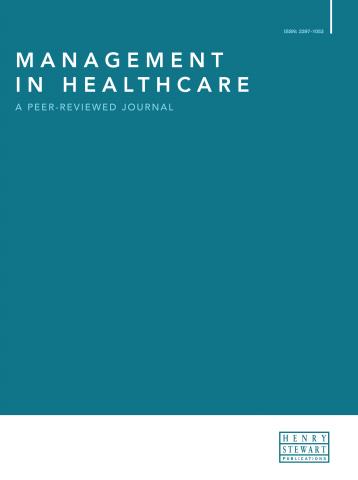"My ambition for the Journal of Data Protection & Privacy is for it to further develop the foundations, tools and methodologies for Privacy by Design, and to help getting them applied in practice."
Remote video auditing in healthcare: A powerful tool for patient and clinician safety culture and operational efficiencies
Click the button below to download the full text of the article.
Abstract: Medicine struggles to effect meaningful improvements in patient safety that do not come at the expense of efficiency. Rarer still are evidence-based tools that can provide sustained safer care while delivering operational efficiencies that produce better clinical and financial outcomes. This paper describes how Northwell Health, New York’s largest health-care provider, has instituted innovative remote video auditing (RVA) technology in its operating rooms, intensive care units and hospital floors, and the results it has achieved in nearly a decade of progressive applications and expanding adoption across its 23 hospitals. The paper demonstrates that implementation of this technology, which is compliant with the Health Insurance Portability and Accountability Act of 1996 (HIPAA), and associated change management, has improved culture and productivity in the operating room and hospital-wide. Benefits achieved through the RVA-with-feedback methodology include increased capacity, improved first-case starts, higher compliance with hand hygiene and the surgical safety checklist, reduced surgical site infections, shorter room turnover and expedited patient flow. The associated increases in patient and surgeon satisfaction, and significant financial savings, have substantial implications for hospitals seeking new pathways to enhanced patient safety and profitability.
Keywords: patient safety; remote video auditing; surgical safety checklist; hand hygiene; operational efficiencies; surgical site infection
Michael H. Goldberg, MBA, MHCDS, FACHE, is the former Executive Director of Long Island Jewish Medical Center (LIJMC), where from May 2015 through the end of 2021 he was responsible for the dayto- day operations of the hospital’s 583 beds, 6,500 employees and 4,000 physicians. Working with the leadership team at LIJ, Mr Goldberg drove clinical and operational initiatives to ensure appropriate, safe, efficient and innovative care to patients. At the heart of the original epicentre of COVID-19 in the United States, Northwell Health treated over 100,000 people, with LIJ located at the centre of the pandemic in Queens, New York. LIJ was also the site of the first non-trial vaccine administered in the United States. Mr Goldberg led the hospital through a critical time, ensuring that high-level clinical care and safety was maintained. Before joining LIJ, Mr Goldberg worked in Northwell’s financial planning department, where he was responsible for capital planning, business plans and financial analytics. He is a fellow of the American College of Healthcare Executives and an adjunct professor at Hofstra University's Department of Health Professions. Mr Goldberg received his master of health-care delivery science from Dartmouth College, and holds a bachelor’s in business administration from the University of Rhode Island and an MBA in finance from Hofstra's Frank G. Zarb School of Business.
Sheldon B. Newman, MD, is the Chairman of Anesthesia at LIJMC and North Shore University Hospital, as well as the Peter F.R. Walker, MD, Chair in Anesthesiology at the Zucker School of Medicine at Hofstra University/Northwell Health. In addition, he is the Area Vice President for North American Partners in Anesthesia–Northwell hospitals, responsible for the clinical and operational management of eight hospitals. Included in these locations are tertiary facilities, community hospitals and ambulatory surgery centres. Dr Newman is a recognised innovator in the areas of patient safety and operating room efficiency. Passionate about improving patient safety protocols and utilising technology to drive measurable results in efficiency, throughput and quality, his vision has been translated into several successful initiatives. Among his clinical and operational innovations, Dr Newman had an operating room (OR) code panel installed in the hospitals’ anaesthesia office, so that when a code blue alarm is called for emergent assistance in the OR, the anaesthesia clinicians are instantly notified, saving response time, and therefore lives. In an example of using simple technology to enhance efficiency, Dr Newman, seeking to improve first-case start times, needed an objective measure to document surgeons’ and anaesthesiolgists’ arrival times. Installing identification card readers, such as those used to open hospital doors, in the holding area proved to be an effective solution. Dr Newman earned his medical degree, graduating cum laude, from the Technion School of Medicine, in Haifa, Israel. He practised cardiac anaesthesia for more than 25 years, and now spends the majority of his time in administrative and executive roles. His professional affiliations include membership in the American Society of Anesthesiologists and New York State Society of Anesthesiologists.



